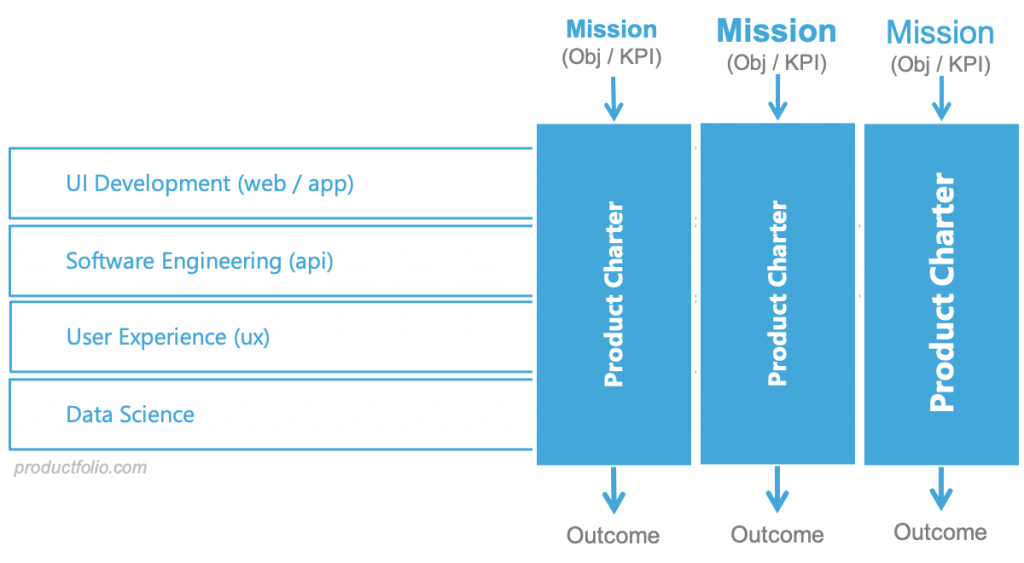What is an Empowered Product Team?
Empowered Product Teams put product managers front-and-center, to guide their respective teams and initiatives.
In traditional companies, it is common for strategy and vision, and roadmap to come entirely from leadership and for the product development teams to execute on that plan. Product Management is more of a functional role in that case, writing requirements and managing the delivery according to needs of “the business”. In truth though, this positions Product to Product to be a hybrid of the traditional I.T. roles of Business Analyst and Project Management, which is in service of the business rather than strategically driving and serving customers.
With modern empowered teams, Product Management plays a more strategic role and is the leader of their team. Ownership of strategy is a cascade, starting with broader business strategy and visions, but allowing room for Product to really figure out what to build, in support of their strategic charter. This fundamentally shifts Product Management from managing outputs, to outcomes, and strategic integration is achieved to objective-driven frameworks such as OKRs or Managing by Objective (MBO).
The reason that empowered product teams are so important, is that it positions Product Manager to be able to truly serve the customer, rather than simply serving ‘the business’. And considering the product is ultimately for the customer afterall, this means the product has a better chance of succeeding in the market.

What makes an Empowered Product Team?
Empowered product teams rely on competency i.e. having the necessary skills that complement both their role and character. In addition, successful teams require to have sufficient resources at their disposal to enable them effectively solve assigned problems and deliver the best value to customers.
An empowered product team owns their product thanks to a clear product vision as well as coaching and support from their senior leaders. In an increasingly dynamic agile environment, product teams have to consistently orient themselves towards meeting their customers’ rapid changing needs as the top-most priority while finding ways to generate revenue for their business. Lack of empowerment slows down and affects product development with people who’re not familiar with customer problems making all the major decisions. Product Managers who excel in their projects overcome fear and create an environment that enables teams to continuously learn and experiment new ideas.
When a team focuses on the customer, it influences how a team performs its duties which transforms into consistent innovation, higher morale and motivation which adds more value to the customer. High performing product teams have learnt how to best leverage their talent in order to help all members realize their true potential and collectively achieve extraordinary results.
Role of Leadership in Product Teams
Agile products thrive where team members take a much more active role in how they execute their duties. In today’s product development environment, micromanaging and ‘comand and control’ leadership style doesn’t work. It’s not about assigning a team a list of features to build and direct them to complete work as fast as possible as this style of leadership doesn’t promote empowerment in any way. The purpose of strong leadership is to inspire and motivate product teams based on the following concepts.
Product Vision
Product vision is a major component of any product development process, but especially important with empowered teams. In an organizational set-up, there are multiple cross-functional product teams which are all striving to move in the same direction to solve a larger problem. Having a clear product vision provides the necessary guidance to an empowered team so they know what to work toward. By pointing the way, we can enable teams to figure out their own solutions, as long as they lead in the direction of the ultimately desired vision and goals.
Product Strategy
The product strategy is the plan put in place to accomplish the product vision. For teams to work effectively, leadership needs to ensure the plan is well-reasoned and compelling while including major milestones that can be used to track progress. When there’s no strategy, teams struggle as they don’t have a path to guide them on how they should move forward. Additionally, product teams can end up incorporating too many things in a single product to try to please a wide range of customers and in the end, not please anyone.
Product Principles
Product principles dictate the nature of products that businesses believe they need to produce. These principles should reflect an organization’s values as well as incorporate strategic decisions that can guide product teams to make the best decisions while attempting to balance trade-offs.
Priorities
There is a lot to be accomplished during product development but only so much can be done in a specified period of time. Product leaders are expected to lead initiatives to identify high-prioritization areas in order to find out what are the most important things that need to be dealt with. When proper objectives and key results are identified, it becomes easier for teams to handle priorities in a way that will ensure customers are satisfied with features that accompany a product release.
Good Product Evangelism
Empowered product teams are as a result of leaders who effectively communicate the vision both to the product teams and across the entire organization. Missionaries are created when everyone involved understands they need to be advocates for the product. This can only be attained from constant evangelization whereby everyone is called upon to be product ambassadors.
Role Coaching Plays in Empowering Product Teams
Coaching is an important element of building strong customer oriented product teams. It is critical for managers to nurture and develop their skills of their teams without having to micro-manage them. Coaching means Product Managers being close to their teams to understand their progress, offer guidance and help to get rid of obstacles. To realize their full potential, each product member should have someone who can help them improve their skills.